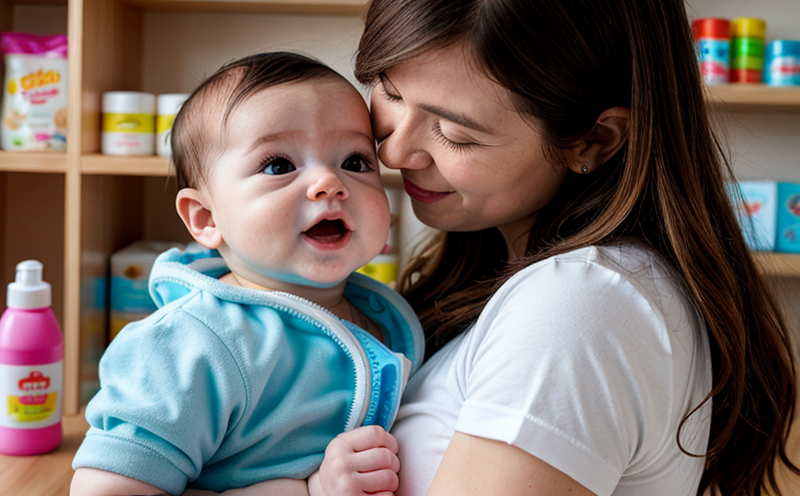EcoLabel Certification Testing for Baby Products
The EcoLabel certification is a prominent symbol of environmental responsibility and sustainability. It signifies that products meet stringent criteria regarding their environmental impact throughout the entire lifecycle, from production to disposal. For baby products, this certification ensures that these items are not only safe but also environmentally friendly, addressing both consumer health and ecological concerns.
Baby products include a wide range of items such as diapers, pacifiers, strollers, car seats, and various toys. Each of these products must undergo rigorous testing to ensure they meet the stringent requirements set by EcoLabel standards. The testing process is comprehensive and focuses on several key areas including chemical safety, biodegradability, energy efficiency, and sustainable sourcing.
For diapers, for instance, testing might include checking for harmful chemicals like phthalates or formaldehyde, ensuring that the material used in the diaper can decompose naturally without causing harm to the environment. For pacifiers, testing would involve assessing their durability and safety under various conditions. In the case of strollers and car seats, tests focus on structural integrity, flame retardant materials, and ergonomic design for maximum comfort.
The certification process is not just about ensuring that a product does not harm the environment; it also involves demonstrating how the product contributes positively to environmental sustainability. This includes using recycled or sustainably sourced materials, minimizing waste in production processes, and promoting energy-efficient designs. The EcoLabel certification thus serves as a benchmark for manufacturers to strive towards more sustainable practices.
For R&D engineers, understanding these requirements early in the design phase can significantly reduce development time and costs by avoiding potential compliance issues later on. Compliance officers play a critical role in ensuring that all products meet not only current regulations but also anticipate future trends in eco-friendly product design. Quality managers need to ensure that every aspect of production aligns with EcoLabel standards, from sourcing raw materials to final assembly.
Procurement teams must focus on selecting suppliers who can provide components and materials that adhere strictly to the stringent criteria set by the EcoLabel certification. This ensures a seamless integration into the overall manufacturing process without compromising on quality or sustainability goals. By adopting such practices, businesses not only enhance their reputation but also contribute positively towards environmental conservation.
Applied Standards
The EcoLabel certification is based on internationally recognized standards that ensure the highest levels of environmental protection and sustainability. These include ISO (International Organization for Standardization), ASTM (American Society for Testing and Materials), EN (European Norms), IEC (International Electrotechnical Commission) among others.
For instance, ISO 14024 specifies requirements for type III environmental labeling and declarations of the environmental characteristics of products. This standard is particularly applicable to baby products as it helps in quantifying the environmental impacts associated with a product's life cycle. Similarly, ASTM D5836 provides guidelines on biodegradable plastic testing which can be crucial when evaluating diapers or other disposable items.
European norms like EN 12904 cover specific aspects related to the classification of textile materials for babies and young children regarding chemical safety. This ensures that fabrics used in baby clothing, bedding, and accessories are free from harmful substances. IEC standards provide benchmarks for electronic devices which might include components within baby monitors or other tech-savvy products.
These standards collectively form a robust framework against which all baby products undergo rigorous testing before being awarded the EcoLabel certification. Compliance with these internationally recognized standards not only ensures product safety but also builds consumer trust and confidence in environmentally responsible brands.
Industry Applications
The application of EcoLabel certification in baby products testing is particularly significant given the unique challenges posed by this category. Babies have sensitive skin, are often exposed to various household chemicals, and rely heavily on their environment for safety and comfort.
In practice, manufacturers use advanced analytical instruments such as gas chromatography-mass spectrometry (GC-MS) for detecting trace amounts of harmful chemicals in baby care products like shampoos or soaps. Fourier transform infrared spectroscopy (FTIR) is employed to analyze the chemical composition of materials used in pacifiers and other oral devices ensuring they do not contain any potentially dangerous compounds.
For larger items such as strollers, rigorous mechanical tests are conducted using machines that simulate real-world conditions like impact resistance or stress testing. These tests help ensure that even heavy objects remain stable during use without causing harm to the baby. Additionally, colorfastness tests are performed on all textiles used in baby clothing and bedding to confirm that dyes do not leach out onto skin.
The certification process also involves assessing the energy efficiency of electrical products like baby monitors or night lights which contribute significantly towards reducing electricity consumption at home. By promoting more efficient use of resources, these tests help create a more sustainable future for all generations.
Competitive Advantage and Market Impact
Earning the EcoLabel certification provides significant competitive advantages in today’s increasingly environmentally conscious market. Consumers are becoming more aware of the environmental impact of their purchases, leading to a growing preference for sustainable products.
Baby care companies that obtain this certification can command premium prices due to their strong commitment to sustainability and safety standards. This not only enhances brand reputation but also increases customer loyalty as satisfied customers tend to recommend these brands to others.
From an operational standpoint, adhering to EcoLabel criteria helps reduce long-term costs by minimizing waste generation during manufacturing processes. It encourages the use of recycled materials over virgin resources thereby lowering raw material procurement expenses. Furthermore, it streamlines compliance with diverse regulatory requirements across different regions thus avoiding costly penalties associated with non-compliance.
Strategically positioning oneself as an eco-friendly brand also opens up new market opportunities in emerging markets where there is a growing demand for sustainable products. This can be especially beneficial when targeting health-conscious consumers who are willing to pay extra for high-quality, environmentally friendly baby products.





